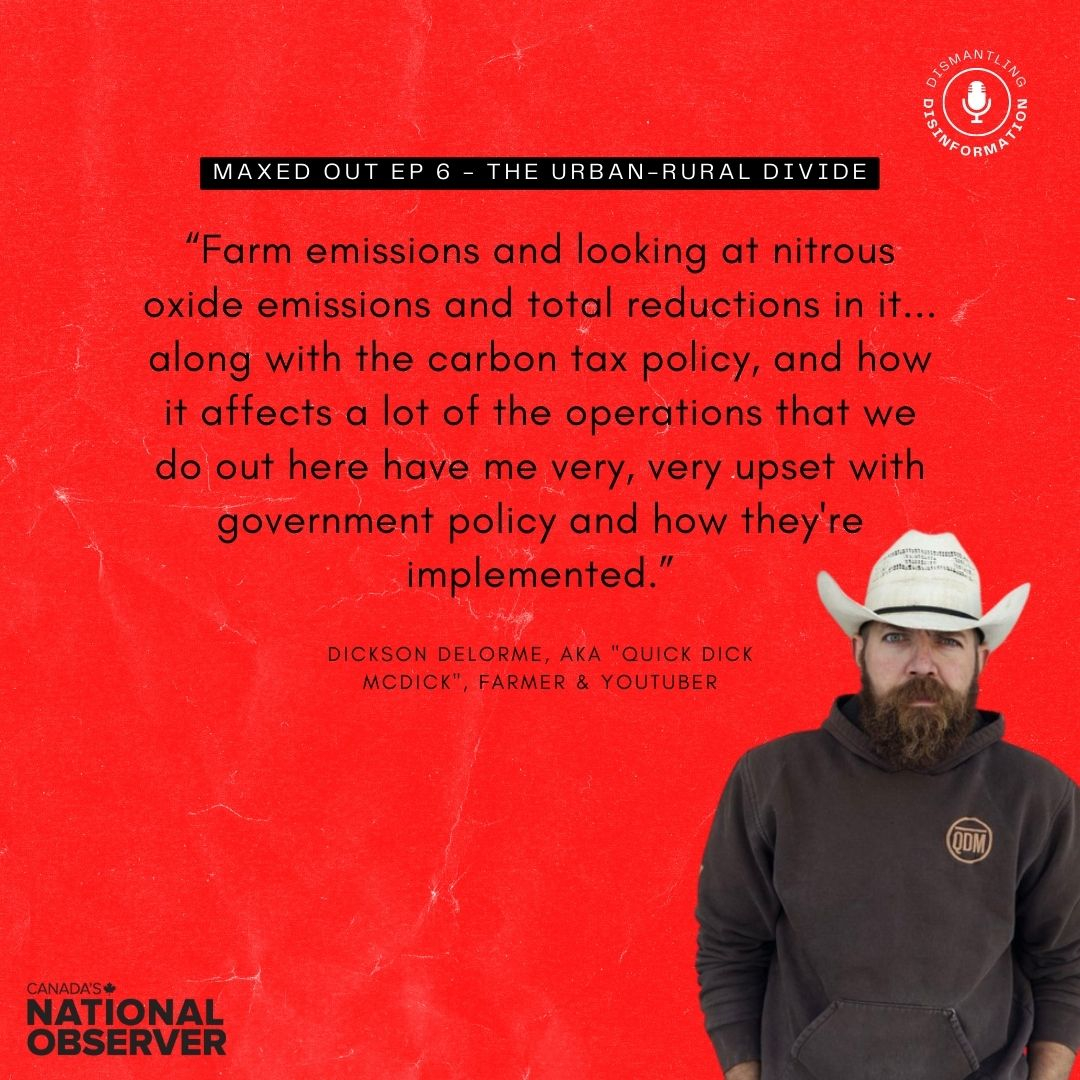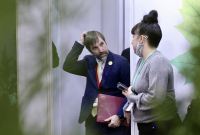Saskatchewan farmer sees the urban-rural divide growing

In Episode 6 of Maxed Out, we talk about the misunderstood and contentious carbon tax contributing to the growing divide between urban and rural Canada.
The federal government's price on polluting is one of its strategies to fight the climate crisis. To find out if it's working — or if it’s even fair — host Max Fawcett talks to farmer Dickson Delorme, who goes by "Quick Dick McDick" on social media.
Delorme works on a 4,000-acre farm in Saskatchewan and has become famous in agricultural circles for his videos that blend political arguments about things like the carbon tax and federal policy with more lighthearted takes on farming and life on the Prairies.
Delorme says rural Canada and our agriculture sector are being hit too hard by the carbon tax.
The carbon tax is too consumer-based, says Delorme. “Farm emissions and looking at nitrous oxide emissions and total reductions in it ... along with the carbon tax policy and how it affects a lot of the operations that we do out here, have me very, very upset with government policy and how they're implemented.”

Max, as a city guy and a supporter of the carbon tax, assesses how farmers like Delorme, who are on the ground in agri-focused provinces, are living with the additional costs.
“[Farming] industries are faced by the same death by a thousand cuts everywhere they go,” says Delorme. “In the end, there's one place that that cost is passed on to, and that's the sucker at the end of the line that's buying their equipment.”
The conversations take an unlikely turn when the two, despite their opposite opinions and lifestyles, plan to go out for a beer.
To learn more about the impact of carbon taxes on Canadian farms and how urbanites can help their fellow Canadians in rural Canada, listen to the full episode of Maxed Out on Apple Podcast or Spotify.
Maxed Out is made possible by listeners like you. If you’ve supported the podcast already, thank you. If you haven’t, click here to donate what you can to help us keep producing valuable journalism.
Got questions or comments? Email us at producer@nationalobserver.com.
You can also follow us on Twitter @NatObserver.






Comments
I read a very interesting article the other day that tracked political contributions over time. In the US, but I would be amazed if there isn't a similar pattern here. What they found was that back in the 70s, all sub-groups of the wealthy donated to the Democrats and Republicans about equally. But since then, there has been a gradual divergence: Rural-based money, like agribusiness (Monsanto etc.), mining, fossil fuels and such, increasingly donated to the Republican party and less to the Democrats. Meanwhile, urban-based money, like Wall Street and big tech, increasingly donated to the Democrats and less to the Republicans. A split has formed between the perceived interests of these different oligarch groups, and they are backing different politicians to push their particular agendas (although both parties still come together for interests those oligarchs have in common, like tax cuts for the rich).
The article theorized that this is related to the increasing temperature of "culture wars" which are largely playing out as rural-ish vs. urban. So like, the split between the interests of different segments of the corporate/oligarch world is driving the cultural conflict and the increasing hostility between Republicans and Democrats. In Canada that would translate to the Conservatives and Liberals.
In theory that might result in Conservatives paying more attention to the interests of rural people and Liberals paying more attention to the interests of urban people, but that isn't really a thing. It's more, Conservatives pay more attention to what cultural red meat to dupe rural people with, and Liberals pay more attention to what cultural issues to fob urban people off with, since in both cases what they're paying attention to is the wishes of big money. Rural big money does not have rural people's interests at heart, and urban big money does not have urban people's interests at heart.
But there are differences; rural big money has no interest in education spending, while urban big money wants an educated (if still broke) work force. Urban big money sees financial risk in climate change, and investment opportunities in new technologies; rural big money owns the existing energy infrastructure and wants no change. And so on.